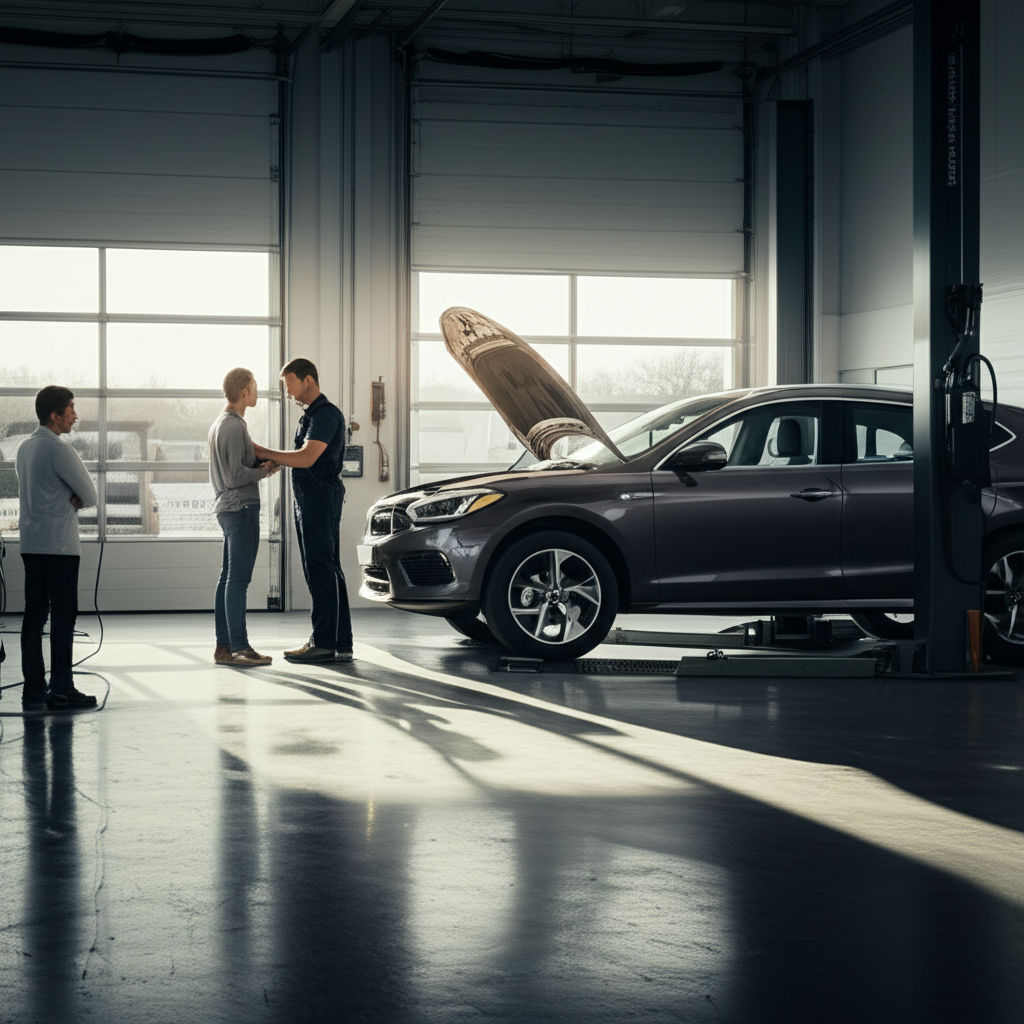Car Auction Guide: Tips for First-Time Bidders
Ellie Moore

Photo: Car Auction Guide: Tips for First-Time Bidders
Car Auction Guide: Tips for First-Time Bidders
Are you a first-time bidder looking to dip your toes into the exciting world of car auctions? Whether you’re searching for a classic car, a daily driver, or a fixer-upper, car auctions can be a great way to find unique vehicles at competitive prices. However, the process can be overwhelming for newcomers. Don’t worry this guide will walk you through everything you need to know, offering valuable tips and insights to help you navigate your first car auction with confidence.
What Is a Car Auction?
A car auction is a public event where buyers and sellers come together to buy and sell vehicles. The auctioneer facilitates the sale, with vehicles being offered to the highest bidder. Car auctions can either be live, where bidders physically attend the event, or online, where bidding happens over the internet.
Auctions are often held by dealerships, government agencies, banks, and even private sellers looking to sell their vehicles quickly. While the auction process may seem fast-paced and intense, with a little preparation, it can be a rewarding experience.
Why Buy a Car at Auction?
For many car buyers, auctions provide several advantages:
- Lower Prices: Auctions can offer significant savings compared to dealership prices, especially if you’re lucky with your bids.
- Variety: Car auctions offer a wide range of vehicles, including rare classics, luxury cars, repossessed cars, and even salvaged or damaged vehicles.
- Transparency: Most auctions allow bidders to inspect the cars beforehand, giving you an opportunity to assess the condition and set a maximum bid.
Tips for First-Time Car Auction Bidders
Whether you're eyeing your first classic car or just looking for a bargain, here are essential tips that will help ensure you make informed decisions and avoid costly mistakes.
1. Do Your Research
Before even considering bidding, it's essential to do thorough research. Here’s what you should focus on:
- Know the Market: Understand the car's value by checking listings on platforms like Kelley Blue Book, Edmunds, or AutoTrader. This will give you a benchmark for what similar cars are selling for.
- Inspect Auction Listings: If you're attending a physical auction, go through the catalog or online listings of vehicles being sold. Look for information on mileage, condition, and any reported issues.
- Check Vehicle History: If available, always check the vehicle history report using services like Carfax or AutoCheck. This will give you details about past accidents, ownership, and more.
2. Set a Budget and Stick to It
It's easy to get caught up in the excitement of bidding, but setting a clear budget beforehand is crucial. Auctions can become competitive, and it’s easy to overbid, especially when you're emotionally invested in winning the car.
- Be Realistic: Consider not just the auction price but also any additional fees, such as buyer’s premiums, taxes, and registration costs.
- Plan for Repairs: If you're buying a used or damaged car, set aside money for repairs and improvements. A "deal" can turn into a money pit if you're not prepared.
3. Understand the Auction Process
Each car auction has its own set of rules, so familiarize yourself with how the specific auction works. Here are a few things to know:
- Bidding Process: In a live auction, the auctioneer will announce the car, and you’ll raise your hand or use a paddle to place bids. In an online auction, you’ll bid through a platform or app.
- Buyer’s Premium: Many auctions charge a buyer's premium an additional percentage of the final bid price. This can range from 5-10% or more, so make sure you account for it in your budget.
- Reserve vs. No-Reserve: Some vehicles have a reserve price (a minimum price the seller is willing to accept), while others have no reserve, meaning they will sell to the highest bidder regardless of price.
4. Inspect the Cars Thoroughly
One of the biggest advantages of car auctions is the opportunity to inspect vehicles before bidding. Take advantage of this!
- Get a Professional Opinion: If you’re unsure about the vehicle's condition, consider hiring a mechanic to inspect the car for you.
- Check for Damage: Look for signs of accidents, rust, or poor repairs. Ensure that the car’s engine, transmission, and brakes are in working condition.
- Test the Car: If possible, take the car for a test drive to check its performance.
5. Know When to Walk Away
At a car auction, it’s important to remain calm and not get swept up in the bidding frenzy. Here’s how you can avoid overpaying:
- Stick to Your Budget: Know the maximum amount you’re willing to spend and don't exceed it. It’s easy to get caught up in the heat of the moment, but remember that there will always be other cars.
- Don’t Chase a Car: If the bidding goes beyond what you’re comfortable with, walk away. There's no shame in passing on a car that isn’t the right fit for your budget or needs.
6. Use Auction Software (For Online Auctions)
Online car auctions have become more popular in recent years, and they come with their own set of unique challenges. One tip for online bidders is to use auction software or apps to track live bids and ensure you're keeping pace with the auction in real-time.
- Set Alerts: Many platforms allow you to set alerts to notify you when an auction is approaching its end or when a car you're interested in is about to be sold.
- Track Auction Trends: Many online auction platforms display bidding trends, which can help you gauge the demand for a car before placing a bid.
7. Know the Fees and Extra Costs
Car auctions often involve additional fees that go beyond the bid price. These can vary from auction to auction, but here are some common ones to watch out for:
- Buyer’s Premium: A fee added on top of the winning bid, typically 5-10%.
- Documentation Fees: These cover the paperwork processing, and can range from $50 to $200 or more.
- Sales Tax: Depending on your location, you may have to pay sales tax on the final auction price.
- Transportation Fees: If you purchase a car from an out-of-state auction, factor in transportation costs for getting the vehicle to your location.
8. Have Financing in Place
If you're not paying with cash, securing financing before you bid is critical. Many car auctions require full payment within a short period after the sale usually within 24 to 48 hours. Arranging financing beforehand will help ensure you can complete the transaction smoothly.
- Pre-Approved Loan: Consider getting pre-approved for a loan through your bank or a lending institution. This will give you a clear idea of your budget and ensure you don’t miss out on a car you love.
- Credit Cards: Some auctions accept credit cards, but this may only cover part of the total cost. Be sure to check the payment policies in advance.
Final Thoughts
Car auctions can be an exciting and rewarding way to buy a vehicle, but success comes from being prepared. From researching vehicles to setting a strict budget, knowing the auction process inside and out will help you avoid costly mistakes and make the most of your auction experience. So, take the time to prepare, stay calm during the bidding process, and know when to walk away. With these tips in hand, you’ll be well on your way to finding a great deal on your next car.
FAQ
1. What’s the best way to prepare for a car auction?
Start by researching the vehicles available for sale, setting a realistic budget, and understanding the auction rules. It's also helpful to inspect the cars in person or use a professional to evaluate their condition.
2. How do I avoid overbidding at a car auction?
Set a firm maximum budget before you begin bidding, and stick to it. If bidding exceeds your limit, walk away. There will always be more cars at future auctions.
3. Can I inspect a car before bidding?
Yes, most car auctions allow you to inspect vehicles before the bidding starts. If you're attending a live auction, be sure to arrive early to have enough time for a thorough inspection.
4. What fees should I expect at a car auction?
Expect a buyer’s premium (typically 5-10%), sales tax, documentation fees, and potentially transportation costs. Always factor these fees into your budget to avoid surprises.
Ready to attend your first car auction? Follow these tips, stay informed, and you're bound to have a successful experience! Happy bidding!
Finance & Investment
View All
June 11, 2025
Finance Salary Trends Across All RolesMaster expert SEO content! Discover how to blend user-centric writing with optimization to boost rankings, drive organic traffic, and establish your brand autho...
Ellie Moore

January 14, 2025
Sustainability and Market Trends: A SynergyDiscover how sustainability is reshaping market trends and why it’s vital for businesses to adapt and thrive.
Ellie Moore

May 30, 2025
Yahooo Finance Latest NewsElevate your rankings with expert SEO content! Discover how E-E-A-T, user-centricity, and originality build trust and value for top search engine visibility.
Ellie Moore

November 29, 2025
Boat Loan Calculator for BuyersUnlock SEO success with expert content! Learn how Google's E-E-A-T framework drives rankings, builds trust, and enhances user experience.
Ellie Moore

April 5, 2025
NVIDIA Yahoo Finance Stock Deep DiveUnlock SEO success! Learn what expert content is, why E-E-A-T is crucial, and how to create high-ranking, valuable content that genuinely helps your audience.
Ellie Moore

June 30, 2025
Capital One Auto Finance Login GuideUnlock organic growth with expert SEO content. Learn how E-E-A-T, quality, and depth drive visibility and establish your brand as a trusted authority.
Ellie Moore
Insurance
View AllSecure optimal car insurance! Our guide helps policyholders & risk managers find top providers, maximize value, protect assets, and avoid overpaying.
Ellie Moore
Don't settle for basic car insurance. Get a premium quote for superior, comprehensive coverage. Protect assets & ensure financial security for policyholders & r...
Ellie Moore
Protect your paycheck with disability insurance. Learn why income protection is a must-have for financial security.
Ellie Moore
Find optimal premium car insurance quotes online. This guide helps policyholders, agents & risk managers compare rates for robust, high-value coverage.
Ellie Moore
Essential Direct Car Insurance: Your Roadmap to Unwavering Protection Are you losing valuable peace of mind and financial security due to inadequate car insuran...
Ellie Moore
Don't let vet bills break the bank. Discover top pet insurance solutions to secure your furry friend's health and your financial peace of mind.
Ellie Moore
Education
View AllShould smartphones be allowed in classrooms? Explore the pros and cons of using smartphones in education and their impact on learning.
Read MoreExplore how virtual reality is revolutionizing learning by providing immersive educational experiences. Ready to see VR in action?
Read MoreDiscover how portfolio-based assessments offer a better way to measure student progress. See how they foster creativity and critical thinking.
Read MoreIs self-directed learning the future? Learn how students can take control of their own education, boost motivation, and achieve better results.
Read MoreProviding education in conflict zones is a major challenge. Learn about the barriers and efforts to ensure learning continuity in crisis situations.
Read MoreSocial skills training is key for kids with autism. Learn practical strategies to improve social interaction and communication in children with ASD.
Read MorePopular Post 🔥
View All
1
2
3
4
5
6
7
8
9
10
Health






Automotive
View All
August 10, 2025
Rick Case Automotive Group Service Highlights
Rick Case Automotive Group redefines vehicle service. Unmatched expertise, customer focus, and value ensure your car gets the best care.

August 30, 2025
Thornton Automotive Experts In Your Area
Find trusted auto repair in Thornton! Learn what defines top-tier automotive experts, from local knowledge to certifications, for peace of mind on the road.

July 10, 2025
Best Automotive Upholstery Shops Near Me Today
Expert guide: Find the best automotive upholstery shops near you. Restore your car's interior for ultimate comfort, enhanced value, and lasting protection.

July 30, 2025
Automotive AC Service Near Me For Cool Drives
Ensure cool, comfortable drives! This guide covers car AC service, common issues, and finding reliable repair to keep your vehicle's AC running perfectly.

August 14, 2025
Are Brunt Boots Good For Automotive Work
Considering Brunt Boots for auto work? Discover if they meet the safety & comfort demands of mechanics, including EH, slip & toe protection.

August 27, 2025
Premium Automotive Services For High End Cars
Luxury & exotic cars demand premium care. Discover why specialized services are essential to preserve their performance, stunning aesthetics, and long-term valu...
















